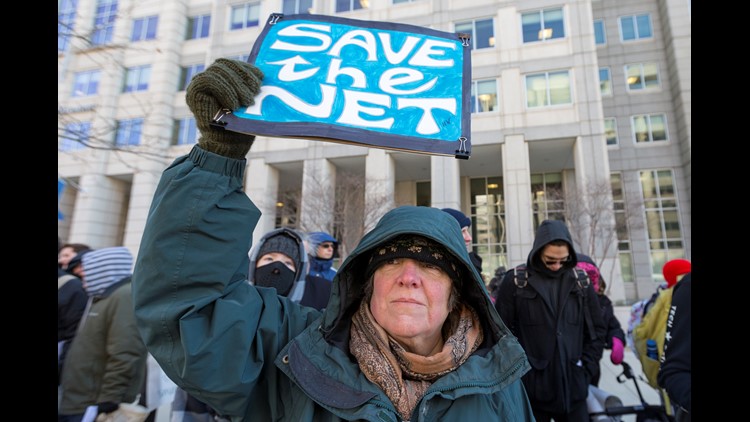The Federal Communication Commission overturned a two-year-old set of rules passed during the Obama administration to protect consumers against bad behavior from their Internet service providers, overriding protests from consumer groups and Internet companies.
The FCC's action is seen as a victory for big telecom and cable companies such as AT&T, Charter, Comcast and Verizon. The current rules, which prevented Internet service providers (ISPs) from blocking and throttling content, went into effect in 2015.
The new regulations, passed by the Republican-controlled commissions' 3-2 vote, instead require ISPs to disclose any blocking or prioritization of their own content or from their partners. They officially take effect after publication in the Federal Register.
But opponents do not plan to go quietly and are already planning strategies to combat the regulations in Congress and the courts. Some in Congress say they will introduce Congressional Review Act legislation to overturn the measure.
And just as previous attempts to pass Internet regulations landed in court, so likely will these new rules. The 2015 measure, passed by an agency then controlled by Democrats and led by Chairman Tom Wheeler, withstood a court challenge from USTelecom, a trade association that counts among its members AT&T and Verizon, and San Antonio-Internet provider Alamo Broadband.
Decrying those so-called net neutrality regulations as "heavy-handed micromanagement" and "utility- style" regulations, FCC Chairman Ajit Pai said the replacement provisions do a better job for consumers and businesses alike.
The FCC's action "is not going to end the Internet as we know it. It is not going to kill democracy and it's not going to stifle free expression online," Pai said. "We are helping consumers and promoting competition."
Appointed as FCC chairman by President Trump in January, Pai voted against the rules when they were passed in February 2015 -- he was a commissioner then -- and has supported "light-touch" regulations that instead require ISPs to disclose any blocking or prioritization of their own content or from their partners.
Under the new rules, called the Restoring Internet Freedom order, ISPs also must disclose any cases in which they prioritize some content, whether its their own or that of a paying partner, over other content. The new order also eliminates an Internet conduct standard meant to prevent ISPs from unreasonable interference with consumer's access to destinations on the Net.
Those against the overturning of the rules conducted an online protest this week and FCC officials were met this morning with protesters outside the agency before today's meeting.
The protests and outcry from consumer groups, legislators and businesses small and larger suggest the broad interest in the FCC keeping strong net neutrality rules, said Commissioner Mignon Clyburn. "The public can plainly see, that a soon-to-be-toothless FCC, is handing the keys to the Internet ... over to a handful of multi-billion dollar corporations," she said.
She and fellow Democratic commissioner Jessica Rosenworcel said they held out hope in Congressional action or a court decision to reinstate the 2015 rules. "If the arc of history is long, we are going to bend this toward a more just outcome. In the courts. In Congress. Wherever we need to go to ensure that net neutrality stays the law of the land," Rosenworcel said.
For their part, ISPs say they don't plan to block or throttle customers' streaming data because it would be bad business. "We don’t slow down, block, or discriminate against lawful content," read a statement from Charter Communications, which serves about 22.3 million U.S. broadband homes. "Simply put, we don’t interfere with the lawful online practices of our customers and we have no plans to change our practices."
The FCC's move reestablishes "light-touch" regulation that "returns a level of certainty for consumer protections and future investment and innovation that spur the growth of the Internet," said Cox Communications, which has about 6 million home and business customers.
Freed from the "burdensome" regulations, ISPs will increase investment and innovation, said David L. Cohen, senior executive vice president and chief diversity officer at Comcast Corp., in a statement. Comcast is the largest Net provider with 25.5 million subscribers. "Today’s action does not mark the ‘end of the Internet as we know it;’ rather it heralds in a new era of light regulation that will benefit consumers," he said.
Regardless, higher prices online could await customers and new online content and service providers, says Consumers Union senior policy counsel Jonathan Schwantes. "Internet service providers scored a victory today," he said. "Without these rules, your internet provider can charge a toll for any website it chooses. The biggest companies can most likely afford these new costs, but smaller companies could be left out in the cold, and that fundamentally changes the level playing field of the internet as we’ve known it."
Follow USA TODAY reporter Mike Snider on Twitter: @MikeSnider.



